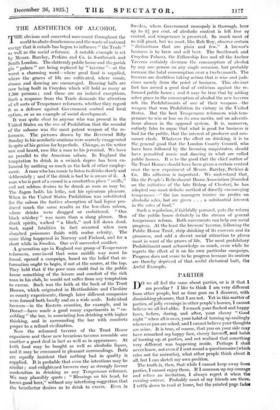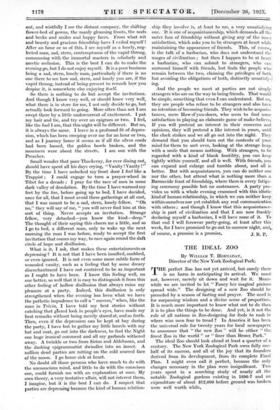PARTIES
The truth is, then, that while I cannot keep away from parties, I cannot enjoy them. If I summon up my courage and refuse an invitation, I always regret it when the evening arrives. Probably most of my friends are there. I settle down to read at home, but the printed page fades out, and wistfully I 'see the distant company, the shifting flower-bed of gowns, the manly gleaming fronts, the nods and becks and smiles and happy faces. From what wit and beauty and gracious friendship have I exiled myself ! After an hour or so of this, I see myself as a lonely, neg- lected man, sad, stern, contemptuous of the vapid throng, communing with the immortal masters in scholarly and ascetic seclusion. This is the best I can do to make the evening go, but I do not enjoy myself. It is a poor business being a sad, stern, lonely man, particularly if there is no one there to see how sad, stern, and lonely you are, if the vapid throng, instead of being present to remark how you despise it, is somewhere else enjoying itself.
So there is nothing to do but accept the invitations. And though I know very well, or should know very well, -what there is in store for me, I not only decide to go, but actually look forward to going. More often than not I am swept there by a little undercurrent of excitement. I pat my hair and tie, and try over an epigram or two. I feel, like the fool I am, that this night will be different. But no, it is always the same. I leave in a profound fit of depres- sion, which has been creeping over me for an hour or two, and as I journey home it seems as if all the silver cords had been loosed, the golden bowls broken, and the mourners were about the streets. I am one with the Preacher.
Small wonder that poor Thackeray, for ever dining out, should have spent all his days crying, " Vanity ! Vanity ! By the time I have unlocked my front door I feel like a Trappist ; I could engage to turn a prayer-wheel in Tibet for a decade ; I pray for the race of men in some dark valley of desolation. By the time I have warmed my feet by the fire, before going up to bed, I have decided, once for all, that I must avoid these gatherings at all cost, that I was meant to be a sad, stern, lonely fellow. " Oh no," they will say of me, " you will never find him at this sort of thing. Never accepts an invitation. Strange fellow, very detached—you know the kind—deep." The thought of their saying this cheers me a little, and so I go to bed, a different man, only to wake up the next morning the man I was before, ready to accept the first invitation that comes my way, to race again round the daft circle of hope and disillusion.
What is it, I ask, that makes these entertainments so depressing ? It is not that I have been insulted, snubbed, or even ignored. It is not even some more subtle form of wounded vanity, such as a feeling that by some dreary disenchantment I have not contrived to be as important as I ought to have been. I know this feeling well, no one better, so well that it is easy to distinguish it from this other feeling of hollow disillusion that always ruins my pleasure at a party. Indeed, this disillusion is only strengthened when the evening has been what we have the pathetic impudence to call a " success," when, like the man in Trivia, I have told my best stories without catching that gtazed look in people's eyes, have made my best remarks without being merely stared at, and so forth.
Then, even if the depression can be kept at bay during the party, I have but to gather my little laurels with my hat and coat, go out into the darkness, to find the Night one huge ironical comment and all my garlands withered away. A twinkle or two from Sirius and Aldebaran, and the dashing epigrammatist dwindles into an insect. A million dead parties are rotting on the cold scarred face of the moon. I go home sick at heart.
No doubt all those persons who have much to do with the unconscious mind, and little to do with the conscious one, could furnish me with an explanation at once. My own theory, a very tentative affair, will not interest them, I imagine, but it is the best I can do. I suspect that parties are depressing because the kind of human relation- ship they involve is, at least to me, a very unsatisfying one. It is one of acquaintanceship, which demands all the outer fuss of friendship without giving any of the inner, satisfaction, which asks you to be strangers at heart while maintaining the appearance of friends. This, of course,' is the talk of a barbarian, who does not understand the usages of civilization ; but then I happen to be at heart a barbarian, who can submit to strangers, who can surround himself with friends, but finds the people who remain between the two, claiming the privileges of both but avoiding the obligations of both, distinctly unsatisfy-) ing.
And the people we meet at parties are not simply, strangers who are on the way to being friends. That would' be simple, something that even I can understand. But no, they are people who refuse to be strangers and also have no intention of becoming friends. They wish to be acquain tances, mere How-d'you-doers, who seem to find some satisfaction in playing an elaborate game of make-believe.' If you will pretend an interest in their concerns and opinions, they will pretend a like interest in yours, until the clock strikes and we all go out into the night. They demand that you should turn out the contents of your mind for them to sort over, looking at the strange heap,, with a smile that means nothing. With strangers, to be regarded with a kind of blank hostility, you can keep' tightly within yourself, and all is well. With friends, you can expand and enlarge and tumble about, and all is better. But with acquaintances, you can do neither one nor the other, but attend what is nothing more than a Barmecide feast of friendship, where there is every fatigu- ing ceremony possible but no sustenance. A party pro- vides us with a whole evening crammed with this idiotic kind of human relationship, in which we can neither keep within ourselves nor yet establish any real communication with others ; and though I know that this acquaintance ship is part of civilization and that I am now frankly declaring myself a barbarian, I will have none of it. To that end I will forswear party-going, at least after this week, for I have promised to go out to-morrow night, and,f of course, a promise is a promise. J. B. P.







































 Previous page
Previous page